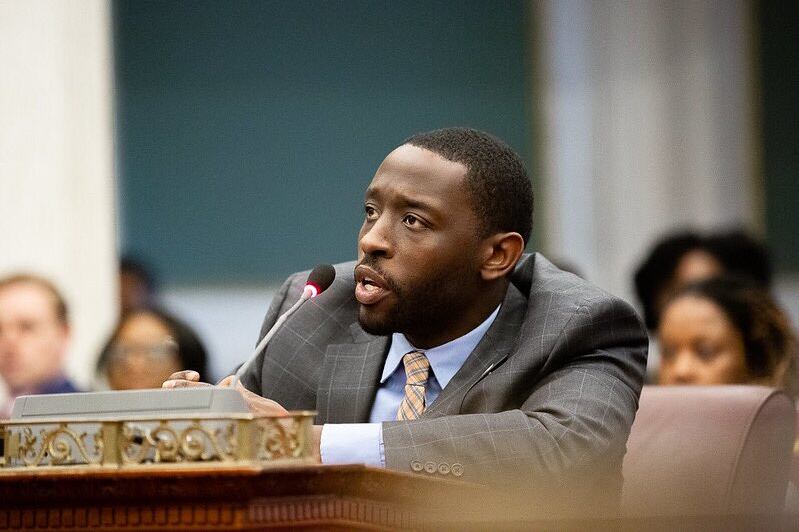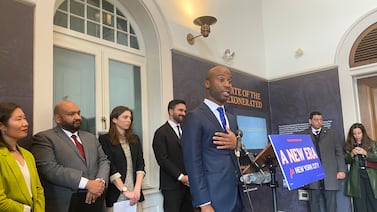City Council plans to hold a hearing in December on whether the district has discriminated against Black-led charter schools.
On Thursday, Council approved a resolution, unanimously and without discussion, introduced by Council member Isaiah Thomas declaring that “Black led and founded institutions have been held to standards that are inconsistent and changed regularly, causing a lack of transparency in the School District’s process of reviewing, managing, and closing non-district led schools.” The hearing is scheduled for Dec. 6.
In a report released last month, the law firm Ballard Spahr found what it considered a flawed and problematic charter school authorizing and renewal process that leaves the district open to charges of bias — but uncovered no evidence of deliberate discrimination against Black-led charters. The report was two years in the making and covered the period between 2010 and 2021.
At the same time, the law firm recommended changes, including more transparency in the charter process and anti-bias training for Board of Education members.
The report was commissioned by the Board of Education in response to years of allegations of racial bias from the African American Charter School Coalition, which represents 17 of 21 Black-led charter schools.
Investigators found that during that period eight of the 13 schools whose charters were revoked by the district were Black-led, even though only about 1 in 5 city charters were founded and continuously led by Black individuals or organizations. (The report also noted that this year the Board of Education voted not to renew the charter of another Black-led institution, Southwest Leadership Academy.)
At the time, coalition officials issued a statement saying that the report backed up its charges of discrimination and “shows that the public school charter authorization process needs to be completely overhauled.”
In Pennsylvania, unlike in some other states, only the host district can authorize charter schools, creating an inherent conflict of interest.
Philadelphia has about 65,000 students in 82 charters, educating nearly 1 in 3 children who attend publicly run schools, and making it one of the largest charter sectors in any major city.
The report said that district officials were aware as far back as 2017 that there were “differential” results in the charter authorizing process, but took no action.
The nine-member school board, appointed by the mayor, has no taxing power of its own, relying on City Council to allocate city funds to the district, most of it through property taxes.
Max Weisman, Thomas’s communications director, said in an interview that there is “anecdotal evidence” pointing to a “different set of standards and a different set of processes that Black-led and white-led institutions go through.” He said that constant personnel turnover in the district’s Charter Schools Office exacerbates the problem, and that white-led institutions have more wherewithal to hire consultants and others to contest a proposed charter non-renewal or revocation.
He said witnesses at the hearing would include district officials as well as charter operators who have been making the allegations.
“It is important that we have oversight over our charter school system, so we can ensure that our public dollars are being spent the right way,” said Thomas in a statement announcing his intent to introduce the resolution. “The answer, though, does not lay in unfairly investigating Black-led institutions.”
Thomas, who sits on the council’s education committee, is a volunteer coach at Sankofa Freedom Academy, one of the city’s oldest charter schools. “I’ve seen myself how beneficial this model is,” Thomas said in a statement. “Black-led institutions are vital entities in the city because they open up students to broader perspectives, leadership and learning styles, and curriculums that not only improve tangible results but also make for a more enjoyable learning experience.”
The district’s Charter Schools Office issues annual reviews on each charter school as well as renewal reports every five years. Those reports evaluate the schools in three areas: academics, operations, and financial health. It gives each charter a rating of either “meets standard,” “approaches standard,” or “does not meet standard” on dozens of metrics. It does not make a formal recommendation to the board on whether to renew a charter or not.
Before approving its own budget and taxes, City Council holds annual hearings on school spending, grilling district officials and board of education members about various policies and making known their own priorities and preferences.
The issue of possible bias against Black-led charters has not come up in the mayoral election that will take place next week between Cherelle Parker, a Democrat, and David Oh, a Republican. Parker has recommended increasing the district’s share of the property tax from 55% to 58% as a way to generate more revenue for the schools. Oh has said he would like to elect five of the nine school board members so that they feel more connected to the community – although that would complicate the issue of taxing authority.
But overall, aside from Parker’s proposal for year-round school, which she has not explained in detail, education policy has not been a big issue in the race.
Dale Mezzacappa is a senior writer for Chalkbeat Philadelphia, where she covers K-12 schools and early childhood education in Philadelphia. Contact Dale at dmezzacappa@chalkbeat.org.






